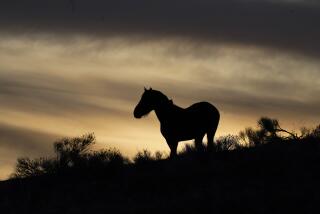Program Led to Slaughter, Foes Say : U.S. Agency Halts Mass Adoptions of Wild Horses
The Bureau of Land Management has suspended indefinitely its controversial wild-horse mass-adoption program that animal protection groups say results in the slaughter of thousands of mustangs rounded up on Western ranges.
Robert F. Burford, bureau director, said Friday that the suspension is being implemented because of “a shifting emphasis” toward other methods of controlling the overpopulation of mustangs.
He said these include heightened efforts to increase individual adoptions of mustangs, especially in the Eastern states, and the proposed development of privately funded wild horse sanctuaries.
Under the controversial mass-adoption program, ranchers have been allowed to take hundreds of animals without paying the regular $125-a-horse adoption fees. The ranchers can sell the horses after keeping them a year.
Nearly 15,000 wild horses have been taken through the fee-waiver program since 1984, more than half of them in the last year, according to Bureau of Land Management spokesman W. Timothy Locke.
Bureau officials say they do not know what happens to the horses once title passes to the adopters. Animal protection groups dispute this, saying agency officials know that most of these horses are slaughtered.
Reacting to Friday’s suspension order, Cleveland Amory, president of the Fund for Animals, said, “Thank God, they’ve finally come to their senses.” He called the mass-adoption program “a cruel stab in the back to America’s wild horses.”
There are 43,000 mustangs running on the range in 10 Western states, bureau officials estimate. These mustangs compete with 3.2 million head of domestic livestock on public lands leased by cattle and sheep ranchers. Burford has said he would like to reduce that number to 31,000, a level he feels will not damage the ranges further.
Annual Roundups
The law does not allow thinning the herds by hunting or euthanasia so adoption has been the primary way to reduce the number of mustangs on the range. Each year, federal horse wranglers, assisted by helicopters, round up several thousand animals and truck them to government holding pens where they are put up for adoption.
The controversy focuses on the fee-waiver adoptions, not the regular “Adopt-a-Horse” program that the bureau has used to place 86,000 wild horses and burros with private individuals since 1976. Increased efforts will be placed on this program, Burford said.
However, the regular adoption program has never kept pace with the bureau’s wild horse roundups. Each year thousands of “unadoptable” horses were left in government corrals. Burford said the agency spends $17.8 million a year to feed these unwanted horses. The mass-adoption program was started in 1984 to dispose of the older, less attractive horses.
Burford’s decision will not affect the 7,000 fee-waiver approvals in the pipeline, an aide said.
Defendant in Lawsuit
The bureau is the defendant in a lawsuit by the Animal Protection Institute of Sacramento and the New York-based Fund for Animals, which charge that the mustangs are pastured by ranchers for 12 months and then shipped to market in violation of the Wild Horse and Burro Act passed in 1971 to stop commercial exploitation of these animals.
Plaintiff attorneys have filed documents with a federal court in Reno contending that bureau officials allowed a major fee-waiver adopter to ship 460 horses from South Dakota to Montana. They said the federal officials knew that the horses were being sent to a slaughterhouse in Canada. Records show 49 mustangs were killed by a Canadian meatpacker before the animal protectionists discovered what was happening and notified Burford.
Bureau officials deny they knew the horses were headed for slaughter.
More to Read
Sign up for Essential California
The most important California stories and recommendations in your inbox every morning.
You may occasionally receive promotional content from the Los Angeles Times.










